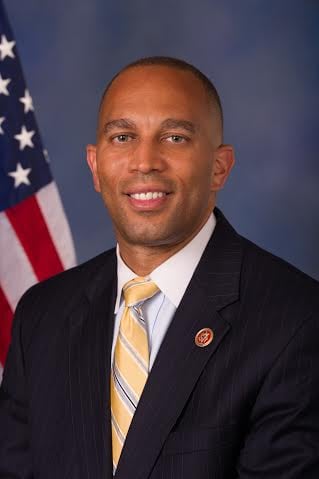Elected just three years ago, Representative Hakeem Jeffries (D, N.Y.) has already proven to be an effective voice for developers in Congress. Since arriving in Washington, Rep. Jeffries has outlined an aggressive agenda to ensure the United States remains the world’s innovation leader by strengthening education and protecting intellectual property. He sits on the House Judiciary Committee as well as the House Education and Workforce Committee. In addition, he is a member of the International Anti-Piracy Caucus, co-chairs the bipartisan Intellectual Property Caucus, and serves as Whip of the Congressional Black Caucus.
Prior to his election to Congress in 2012, Rep. Jeffries held a clerkship in the U.S. District Court for the Southern District of New York, practiced law, and served in the New York State Assembly. His New York City congressional district includes parts of Brooklyn and Queens.
As part of our Beltway Voices series, we caught up with Representative Jeffries to discuss a variety of issues important to developers.
Application Developers Alliance: As you know, patent trolls continue to wield overbroad, never-should-have-been-issued patents to extort businesses in every sector of our economy. They are chilling innovation and job growth. The Innovation Act (H.R. 9), of which you are a cosponsor, would go a long way to curb abusive trolling behavior. Given your front row seat as a member of the House Judiciary Committee, can you impart any words of wisdom with reform supporters on how to get the bill passed and signed into law? Do you expect improvements to be made to strengthen the pleading and demand letter provisions?
Representative Hakeem Jeffries (D, N.Y.)
Representative Jeffries: Patents provide the incentives for American industries to invent and innovate. And obviously abusive litigation practices are not limited to patent enforcement. But because intellectual property is so critical to America’s economy, job growth, and competitiveness, I am very concerned with the abusive patent litigation that has adversely affected American companies.
The Innovation Act (H.R. 9), which currently has 27 co-sponsors in the House including myself, enjoys bipartisan and bicameral support. The House had previously passed a version of the bill in the 113th Congress. And now during the 114th Congress, this bill has been marked up in the House, and we are waiting for it to move forward.
Application Developers Alliance: In today’s software marketplace consumers demand their communications and data remain private. Many developers are employing end-to-end encryption technologies to meet these demands, but some law enforcement entities cite the need to access data and communications through built-in “backdoors” to track down bad guys. The tech sector is nearly unanimous in its belief that any backdoor – even those created for law enforcement – will weaken software security and increase the risk for fraud or identity theft for users. What is your response?
Representative Jeffries: The Internet has become a major component of the daily economic and personal activities of most Americans, and encryption plays a critical role in protecting our personal information–from our identification to our credit card numbers and health records. The Internet is also critical to the way that American companies do business and communicate, and strong encryption is necessary to protect trade secrets and confidential business data.
Advancements in encryption technology have complicated law enforcement efforts to prosecute wrongdoers and keep the people of this nation safe. As Members of Congress, it is our duty to provide law enforcement with the tools they need to be successful, but not at the expense of cherished and constitutionally protected privacy rights.
I am deeply concerned about the potential unintended consequences of creating “backdoors” for law enforcement, especially at a time when software security is becoming more and more crucial to our personal and national security. Our government agencies must find ways to enforce the law without leaving the American people more vulnerable to identity thieves and other cybercriminals.
Application Developers Alliance: You, along with more than 300 of your colleagues, support the Email Privacy Act (H.R. 699). This commonsense bill would update the Electronic Communications Privacy Act of 1986, which has failed to keep pace with evolving technologies. The Email Privacy Act would require the government to obtain a warrant before accessing our emails, granting email the same legal protections as standard mail. With such a broad and bipartisan coalition of supporters why hasn’t the bill received a vote in committee? What can developers do to help?
Representative Jeffries: As a steadfast advocate for privacy rights, I believe the American people have an expectation of privacy when it comes to their emails. However, despite their omnipresence, current law entitles them to fewer protections than letters in a filing cabinet. When Congress enacted Title II of the Electronic Communications Privacy Act, it was intended to protect consumer privacy interests by providing clear standards for law enforcement with respect to emerging technologies. Advances in technology rendered these protections obsolete. There is now a broad consensus amongst both privacy advocates and private industry that the law must be reformed. Despite broad support for reform, Congress has been slow to address the matter.
Passage of the Email Privacy Act (H.R. 699) is wrapped in the greater debate regarding how to balance privacy rights and security concerns currently taking place on the Hill. Members of both parties have consistently struggled to reach a consensus on how to balance the security concerns of law enforcement with constitutional expectations of privacy, leaving consumers vulnerable to government overreach and service providers and software developers in a legal grey area.
The Judiciary Committee recently held a hearing on the Email Privacy Act (H.R. 699), and these concerns formed the center of the debate between members on both sides of the aisle. The hearing represented a critical step in advancing the legislation, as the testimony demonstrated what I and other proponents have long argued, that we can preserve individual privacy without negatively impacting public safety. Software developers must continue their advocacy efforts, as their support was critical in convincing the Chairman of the importance of holding a hearing and will be important in securing a future vote in Committee.
Application Developers Alliance: Developers depend on data to create new products and improve existing ones. The products they create may collect vast troves of data, and some of that data might be personal in nature. Developers also know that good data stewardship is paramount to create the consumer trust needed to grow their businesses. What role, if any, do policymakers in Washington play in this relationship?
Representative Jeffries: The amount of computer data has been growing exponentially, and analyzing these large data sets —“big data” — will become a key component to maintaining and increasing America’s competitiveness, productivity, economic growth, and innovation. More specifically, big data can be used to make more accurate predictions and better decisions. This has the potential for saving lives, ameliorating risks, reducing costs to consumers, and making companies more efficient.
Nevertheless, there is reason to be concerned about the privacy of American citizens and the risk that indiscriminate use of big data could lead to new modes of discrimination in housing, employment, or credit.
As new technologies develop in this arena, Washington policy makers will need to shape policy that will promote the benefits of big data while ameliorating the downside and risks.
Application Developers Alliance: It is well documented that our nation’s students are lagging behind other countries in STEM (science, technology, engineering, and math) proficiency. What are you and your colleagues doing to change this?
Representative Jeffries: As a father to two boys, STEM education is an issue that is personal and close to my heart. I believe that STEM education is the key for the next generation of American inventors and entrepreneurs to maintain the edge of American competitiveness.
To that end, I am a co-chair of the Congressional App Challenge, which is a Congressional initiative to engage U.S. high school students in coding and computer science through the creation of apps. The winning students will have their apps featured on a display in the Capitol Building, and will be honored by their Member of Congress.
Application Developers Alliance: Technology in the classroom has proven to be beneficial for students, parents, and teachers alike. With new technologies, students can learn at their own pace, parents can keep track of their child’s progress, and teachers can tailor lesson plans depending on a student’s progression. Some in Congress are calling for limits as to what student data is collected and how lon
g that data can be retained. What are your thoughts?
Representative Jeffries: Maintaining student privacy while harnessing the benefits of technology is an important balance that we must strike.
Any legislation concerning student data needs to address issues such as the use, collection, mining, sharing, transferring and destruction of sensitive data and information. Good data stewardship also needs to protect students and their families from hacking and illegal disclosure of data.
Geoff Lane
U.S. Director of Policy and Government Relations







